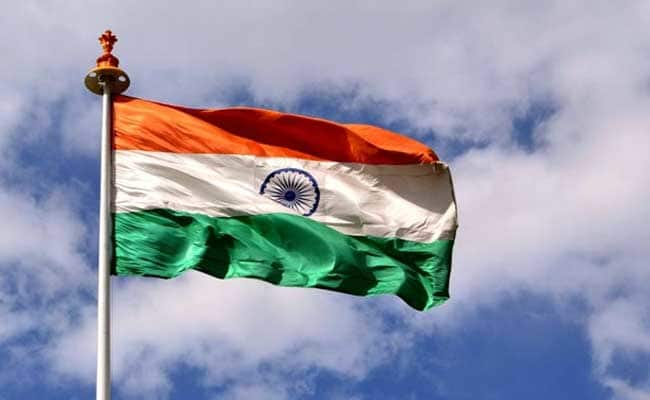
If we were to imagine our journey towards the 73rd Republic Day as a long, tiring and sometimes treacherous trek through the Himalayas, then looking back we can be proud that we managed to survive some dangerous terrain. The mountains were right at the beginning where we were air-dropped by the colonial powers, into the death-zone. The lack of adequate preparation took us some months to understand stone from snow and it took a few years before we got a foothold on the matters. We managed to trudge through the passes and frozen-streams of maladministration, politics and famine. We covered great distances, always hopeful about the greener pastures ahead that were just beyond reach, yet seemed tantalizingly close.
While we consider what passed, we should also consider what is to come. But that is apparently difficult today, as we find ourselves in a valley. Unlike what we perhaps expected, it isn’t the picturesque green or flowery meadows, but instead a forest of tall green trees with a thorny understorey. This makes our future journey a mysterious affair. We grope in the darkness for the way out while nurturing a fear of being unable to see light again. We camp each night under the stars, looking for answers. However, our momentary confusion and disorientation, which are close companions of an adventurous trekker, should not be mistaken for a complete lack of ability to imagine the way forward. We do have an understanding of what curves and elevations are to be expected. It is just that we are a bit tired and in need of some youthful energy, vigour and spirit to get us out of the jungle. It will certainly take weeks, months or years as very less ground will be covered each day.
On the 73rd Republic Day, India will, as ever, show off its economic and political might. This will be done under the guise of showing off our unity, diversity, culture and heritage but we could surely have done better if each of those 73 years meant a further strengthened constitution. Our constitution is the result of hard work of many souls who believed that they had reclaimed from the colonizers something precious; something that needed direction and long-term nurture, but, at the same time, a jump-start too. Hence, there were a lot of incomplete tasks that needed periodic pit-stops for maintenance. That very constitution, the document that postulates the intent, meaning and methods of our idea of India, framed within the ethical constructs that we inherited as a civilization, and its organic and spiritual growth is the only thing that needs to be proudly paraded on our Republic Day. But alas, what we will instead parade is our ignorance and denial about the manifold challenges facing us, primarily that of the question about the youth of this country.
Throughout our journey, it is the youth and the youthful of our country who were at the forefront, beginning with the Indian Independence Movement itself. Yet, owing to the fact that we reference and remember them from a point in time many generations later, we make the mistake of attributing elderliness to them. Doing so is to strip away their very identities and is a disservice to both the individuals as well as an entire generation. Back then, before they made household names for themselves by being part of movements that would rewrite our history, they were targets of ridicule, insult and character assassination. Being branded “terrorist” or “seditious” was nothing new to the youth of the day, who later went on to be revered by us and were showered with gratitude. All of them, the youth of then and now, even the youthful among us, share qualities innate to the young; the ability to question authority, take risks, speak truth to power and a sense of adventure that usually erodes, in humans, with age.
Post Independence, it isn’t that we suddenly transformed into a society that understood and accepted youth. The young continued their struggle against the world as much as their struggle with authority at home. As is always the case, it is easier to deal with the demons outside the home than the ones within. So, many among us were happy to fix the problems that were physically farther from us than to tackle the ones closest. Since this tendency is not inherently harmful, we did get a society that transformed; many things changed, yet something deep-rooted did not. Authority and patriarchy remained; so did the authority in organizations and institutions. Ironically enough, even today, so many of our so called alternative movements fail because we do not understand the youth, do not delegate, do not trust and do not share responsibility. In the hundreds of such spaces, be it small-scale enterprises, cooperatives, NGOs, schools or political parties, there are never any plans for a second-rung leadership. How do we then go against the tide, when despot-like characters inspire others to do so, but are unwilling themselves? How are we to work towards a democratic system when these same leaders do not wish to walk-the-talk and imbibe democracy into their ethos? Note here, that it is the same alternative space from where the constant complaint of “youth does not join us” echoes. Instead, we should “join the youth” and we will perhaps get to see the light.
What we are going through in the last few decades in this country can be viewed as a result of the choices we made as a society. That is to say, it is a result of decision making and paradigm shifts that were made at different points in history. It can also be seen as the result of what was being normalized each time with every milestone we passed with a relative connection to the previous one. So, one way to look at our situation today is to look at all the good and bad choices we have made enroute. But those kinds of forks in the road only sum up to so much, when, in comparison, our larger problems are a result of choices we failed to make even before the colonial powers arrived. Consider an imaginary visionary young person who was with us at any point in history and he/she would simply have predicted our present situation as a predetermined outcome. The tendency to not incorporate the young into the discourse is as old as the hills. Over the seven decades that passed, youth have always felt that they were not only excluded but also stonewalled by all the units of society. Today, if our politics and our governance tends to authoritarianism and even fascism, it is because we let such tendencies slyly make themselves comfortable in our homes.
Too many of us, too many times, jump from doing nothing for the youth to the other extreme, that of solutions; education, jobs, livelihood etc. But the clarion call here is not for us to abruptly act based on our own understanding of the problem or provide instantaneous solutions. The youth of our country, why, no known youth is waiting for our solutions at all. What they need first and foremost is to be listened to. Not the kind of listening-to from the peripheries by setting up “youth wings”, “forums” and other token pedestals. Not the kind of farcical participation they get while providing only manpower to the larger causes led by the old. Also, not the kind of listening-to by asking them for opinions on matters for which we walked in with prior agendas and pre-baked, solidified ideas. The kind of listening talked about here involves devolving leadership. It is about entrusting youth with matters of large scope and scale. It involves stepping out of the way, and then listening.
This kind of listening will quite possibly go on for days, months and years. So what! We adults weren’t dropped here from the heavens. The young of any period in time have the same anxieties, questions, performance-concerns, validation-requirements and visions that are as spectacular and colourful as youthfulness itself. We need to be patient in our listening. The pent up anger and generations of frustration will ensure that nothing might be communicated at first. The other reason for it is that we hardly understand the grammar here, let alone the language of the youth. Hence the listening-to also involves an unlearning process for us where words, symbols and meanings will be different and there will be a lot of catching up to do. It will take some time, but at the end of it all, if we have been a worthy audience, and more so, if we have been trustworthy of potential advisors, then there will be reciprocation. It is thus very important that the elders dedicate a lifetime to listening; both at home as well as in a society. Listening, however, is not an easy task, considering that we participate-in as well as tolerate verbal diarrhoea from most platforms and from all of the ones in power. We have gotten used to the idea that speeches and talking only have a formal purpose, and so, we need to alter that mindset and actually register what the young are saying. In the best of the best organizations, even in the most well meaning institutions, what we see is an exodus of youth after we have tested their patience while patting each other’s backs. We ourselves, having walked away from pointlessly long self-congratulations numerous times while we were young, can clearly understand why the young do so.
There will always be a few among us who will disagree with the idea of devolving power to the youth whom they refer to as “the inexperienced”. That attitude stems more from our ego and identity crisis than from any form of objectivity. When a 60 year old is making a decision on behalf of or impacting the 20 year olds, then the 60 year old only needs to live with the repercussions for another 20 years or so. The younger ones, on the other hand, need to live three times as much, and more often than not, in outcomes that have turned out to be disadvantageous for them. The old base their decisions on the past while the young will make their choices for the future. As we all know, no current decision can influence or fix the past. So instead, let us always prioritize the future.
This brings us to another important point; that of failure. Are we willing to accept failure? Do we come from backgrounds that accepted failure as a completely normal element in human endeavors? More often than not, the answer is “no”. Our inability to accept the failure of others – especially of the youth – stems from delusions about our own success. This kind of delusion, oddly enough, comes with a false sense of clarity about the paths we have chosen. Hence we try to course correct the young right in the middle of their journeys because we feel entitled. However, if we were to look into the mirror collectively and say that we have succeeded, then why are we not sitting back and enjoying the fruits of a fulfilling life provided by the perfect idea of India? Denial has this quality of providing solace to the individual while destroying everything around them. It is better to accept that we have failed in many respects while perhaps having made some contribution here and there. Hence, it is prudent to accept that others will fail too, especially the youth, because they are willing to take risks beyond our comprehension.
So while truly empowering the youth at home, and by extension, also the country, is one of our challenges, the youth themselves have a bigger challenge to face. They have inherited from us a planet that has been massively depleted of its resources. They were born amidst heaps of garbage that we have generated. They breathe the poison that we call air. With patrimony such as this, combined with other forms of social inheritances, we should clearly see why their journey further would get a much needed relief if we were to remove the largest hurdle we have erected in their path; ourselves. On the climate and environment front, even if one were to argue that the worst outcome is not a realistic possibility, what cannot be argued is the quality of life that awaits the youth. Competition for resources, a harder life, harsh and unbearable weather, unexpected and frequent catastrophes will be part of their normal life. One does not need the privilege of having lived longer to see the misery that has been brought forth on us just in the last decade, and, more so, in the last few years. The youth are mature enough to see through the optics and understand that a lot of this has to do with our inadequacy and sometimes incapability of being good stewards. Considering that we have thrown them under the bus, it would be better off letting them figure out a way out rather than plan for them yet another pathway that is coloured by our past choices. Today, the youth in India should understand that their own future and the future of the world – as they themselves conceptualize it – depends on their current actions.
Also, the youth of today find themselves congregating in large numbers in the cities. The journey to the cities, the make-or-break moments and the survival tactics to stay afloat in the cities is symbolic of the competitive spirit that the system has instilled in our youth; the same unjust systems that they have inherited from us. Large unsustainable populations that are in such densities, thereby, are not just the cause of an ecological problem but also a social and psychological one. However, it is also heartening to note that it is the very youth from urban and semi urban spaces, who, as if by magic, find the last bit of energy and courage to rise up during protests and movements, when they are called upon. We need this ever reliable youthful energy to spread out and represent more of India than it does today. The vastness, diversity and beauty of our country is cheated of its potential thanks to the undue attention that floods upon the Delhis, Mumbais and the Bangalores. The need of the hour is to find a way out of the system itself by looking at possibilities where the youth could engage, live and find purpose in all nooks and corners, including the last of the villages.
Old or young, we have no option other than to find a way out of this dark valley. But to do that we would need some radical changes and new ways of looking at the world. Since these are desperate times, it might be tempting to go about the act in a regimental manner; a world built on more rules, norms and conventions pushed top-down. But that kind of approach is precisely what led us here. What we could do instead is hope to achieve a healthy amount of self-transformation as desired in a book that is incidentally older than the constitution itself. Gandhiji’s Hind Swaraj was not written by the old, toothless, smiling bald man that we usually visualize when we write, hear or read his name. It was written by a middle-aged version of him who had a rather mature head on his shoulders. This younger Gandhi, like any human being, was still learning to be the Gandhiji we know today, but no credit can be taken away from the raw spirit, enthusiasm and confidence that his 15 years of youthful exploration has poured into the text of Hind Swaraj. The idea of self-transformation was something he borrowed from his various influences and inspirations. Can we find similar inspiration and begin our self-transformation process? It will be 73 years overdue for a lot of us. But there are no known penalties for starting late.
The challenges are insurmountable if we do not instill qualities such as inquiry, logic, wonder etc into our lives. Without them, our civilization can be lulled into a false sense of pride and will subsist on mediocrity. Also, we need to be able to protect and secure knowledge from manipulation while simultaneously making it freely available for all. Without the sources that a young Gandhi had at his disposal during his time, he wouldn’t have been able to formulate a vision, spell out ideas or chart out a plan. We need to enable our youth to gain all kinds of perspectives that are available before acting on anything at all. Self transformation, while being a deeply personal project, with the intent of coalescing into a larger organism called the society, is however, not a personal project when it comes to its daily ramifications. Self transformation involves creation-of and working-with communities, nurturing meaningful, long-lasting friendships and an understanding of the suffering in the world. It is impossible to find any motivation to transform oneself unless one sees the influence one has over other living creatures. As we grow older we seem to lose the capability to quickly and effectively move to action even by the worst tragedies. This is not necessarily a bad quality as this must have developed in us, as a species, due to a survival instinct. But this is the reason the youth are our best chance. The ability of the young to be quickly moved by external influences, especially when it comes to issues of injustice is typical of that age. We need to allow the youth an opportunity for a personal transformative journey.
So while we stand here in a blanket of darkness, staring at some odd stars in the sky, the trek ahead is something we want to continue yet again tomorrow, but the dense and thorny bushes ahead tempt us to halt and rest, or simply retreat. We should obviously brush aside such temptations and march ahead instead. We have our young and our youthful. The most energetic among us will take the lead and sculpt a trail. The lone challenge that remains now is time itself. Do we have the luxury of time to get out of this dark valley before we give up entirely or are consumed by the weight of the challenges? That is something that we should perhaps not worry about, but instead, use as a reason for acting right now.
Ratheesh Pisharody is a writer from Bangalore















































